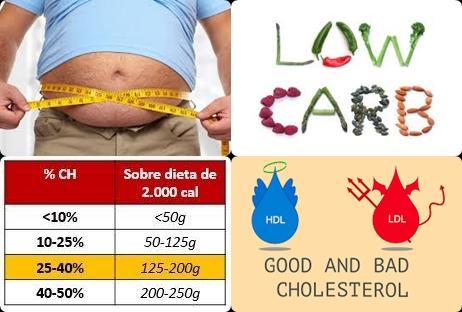
Objectives:
Carbohydrate-restricted diets may increase low-density lipoprotein cholesterol (LDL-cholesterol or bad cholesterol) and thereby cardiovascular risk. Therefore, this review article has been conducted.
Do carbohydrate restriction diets increase cholesterol and triglycerides levels in overweight/obese adults?
Study design:
This review article included 8 RCTs with a total of 1,633 participants, of which 818 in carbohydrate-restricted diet group (intervention group) and 815 low-fat diet group (control group).
All RCTs had more than 100 participants with duration of at least 6 months.
Results and conclusions:
The investigators found when compared with low-fat diets, carbohydrate-restricted diets showed no significant difference in LDL-cholesterol levels after 6, 12 and 24 months.
Although an overall pooled analysis statistically favoured low-fat diets [0.07 mmol/L, 95% CI = 0.02-0.13, p = 0.009], this was clinically insignificant.
The investigators found when compared with low-fat diets, carbohydrate-restricted diets significant increased HDL-cholesterol (good cholesterol) levels [0.08 mmol/L, 95% CI = 0.06-0.11, p 0.00001] after 6 and 12 months.
These favourable changes were more marked in the subgroup with very-low carbohydrate content [50 g/d: 0.12 mmol/L, 95% CI = 0.10-0.14, p 0.00001].
The investigators found when compared with low-fat diets, carbohydrate-restricted diets significant reduced plasma triglycerides levels [-0.13 mmol/L, 95% CI = -0.19 to -0.08, p 0.00001 after 6 and 12 months.
These favourable changes were more marked in the subgroup with very-low carbohydrate content [50 g/d: -0.19 mmol/L, 95% CI = -0.26 to -0.12, p = 0.02].
The investigators concluded large randomized controlled trials (RCTs) of at least 6 months duration with carbohydrate restriction, particularly 50 g/d carbohydrates, is superior in improving HDL-cholesterol and triglycerides levels in overweight/obese adults when compared with low-fat diets. Dietary guidelines should consider carbohydrate restriction as an alternative dietary strategy for the prevention/management of dyslipidemia for populations with cardiometabolic risk.
Original title:
Effects of carbohydrate-restricted diets on low-density lipoprotein cholesterol levels in overweight and obese adults: a systematic review and meta-analysis by Gjuladin-Hellon T, Davies IG, […], Amiri Baghbadorani R.
Link:
https://www.ncbi.nlm.nih.gov/pubmed/30544168
Additional information of El Mondo:
Find more information/studies on carbohydrate, cholesterol and overweight right here.
50 grams of carbohydrates per day corresponds to a diet with 10 En% carbohydrates.
The easiest way to follow a diet with 10 En% carbohydrates is to choose only meals/products with 10 En% carbohydrates.
However, the most practical way to follow a diet with 10 En% carbohydrates is all meals/products that you eat on a daily basis should contain on average 10 En% carbohydrates. Check here which products contain 10 En% carbohydrates.